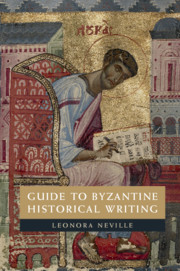Book contents
- Frontmatter
- Dedication
- Contents
- Acknowledgments
- Introduction
- Byzantine Historical Texts
- 1 Theophylakt Simokatta
- 2 Paschal Chronicle
- 3 George Synkellos
- 4 Chronicle of Theophanes
- 5 Patriarch Nikephoros
- 6 Scriptor Incertus de Leo V
- 7 Chronicle of 811
- 8 Megas Chronographos
- 9 George the Monk
- 10 Peter of Alexandria
- 11 Genesios
- 12 Theophanes Continuatus
- 13 Constantinian Excerpts
- 14 John Kaminiates
- 15 Symeon the Logothete
- 16 Leo the Deacon
- 17 Chronicle of Monemvasia
- 18 Chronicon Bruxellense
- 19 Psellos
- 20 John Xiphilinos
- 21 Michael Attaleiates
- 22 John Skylitzes and Scylitzes Continuatus
- 23 George Kedrenos
- 24 Nikephoros Bryennios
- 25 Anna Komnene
- 26 John Kinnamos
- 27 John Zonaras
- 28 Constantine Manasses
- 29 Michael Glykas
- 30 Eustathios of Thessaloniki
- 31 Joel
- 32 Niketas Choniates
- 33 George Akropolites
- 34 Theodore Skoutariotes
- 35 George Pachymeres
- 36 Nikephoros Gregoras
- 37 Ephraim
- 38 Constantine Akropolites the Grand Logothete
- 39 Chronicle of Morea
- 40 Nikephoros Kallistos Xanthopoulos
- 41 John VI Kantakouzenos
- 42 Michael Panaretos
- 43 Chronicle of Ioannina
- 44 Chronicle of Tocco
- 45 John Kananos
- 46 John Anagnostes
- 47 Leontios Machairas
- 48 Sylvester Syropoulos
- 49 Doukas
- 50 George Sphrantzes
- 51 Michael Kritovoulos
- 52 Laonikos Chalkokondyles
- Appendix A Time Periods Covered in the Histories
- Appendix B Timeline of Authors’ Lives
19 - Psellos
from Byzantine Historical Texts
Published online by Cambridge University Press: 14 June 2018
- Frontmatter
- Dedication
- Contents
- Acknowledgments
- Introduction
- Byzantine Historical Texts
- 1 Theophylakt Simokatta
- 2 Paschal Chronicle
- 3 George Synkellos
- 4 Chronicle of Theophanes
- 5 Patriarch Nikephoros
- 6 Scriptor Incertus de Leo V
- 7 Chronicle of 811
- 8 Megas Chronographos
- 9 George the Monk
- 10 Peter of Alexandria
- 11 Genesios
- 12 Theophanes Continuatus
- 13 Constantinian Excerpts
- 14 John Kaminiates
- 15 Symeon the Logothete
- 16 Leo the Deacon
- 17 Chronicle of Monemvasia
- 18 Chronicon Bruxellense
- 19 Psellos
- 20 John Xiphilinos
- 21 Michael Attaleiates
- 22 John Skylitzes and Scylitzes Continuatus
- 23 George Kedrenos
- 24 Nikephoros Bryennios
- 25 Anna Komnene
- 26 John Kinnamos
- 27 John Zonaras
- 28 Constantine Manasses
- 29 Michael Glykas
- 30 Eustathios of Thessaloniki
- 31 Joel
- 32 Niketas Choniates
- 33 George Akropolites
- 34 Theodore Skoutariotes
- 35 George Pachymeres
- 36 Nikephoros Gregoras
- 37 Ephraim
- 38 Constantine Akropolites the Grand Logothete
- 39 Chronicle of Morea
- 40 Nikephoros Kallistos Xanthopoulos
- 41 John VI Kantakouzenos
- 42 Michael Panaretos
- 43 Chronicle of Ioannina
- 44 Chronicle of Tocco
- 45 John Kananos
- 46 John Anagnostes
- 47 Leontios Machairas
- 48 Sylvester Syropoulos
- 49 Doukas
- 50 George Sphrantzes
- 51 Michael Kritovoulos
- 52 Laonikos Chalkokondyles
- Appendix A Time Periods Covered in the Histories
- Appendix B Timeline of Authors’ Lives
Summary
Psellos is one of the greatest figures in Byzantine literature. His baptismal name was Constantine; he took the name Michael during a monastic retirement in 1054. Born in Constantinople in 1018, Psellos received an outstanding education and, after serving in the provincial judicial administration, had a successful career as a court rhetorician and philosopher. By his own account in the Chronographia, he was an influential courtier, although he may have been less important than he would like his readers to believe. He taught philosophy and had the title Hypatos ton Philosophon, “consul of the philosophers,” during the reign of Constantine IX (1042– 1055). Psellos became a monk in the monastic community at Mt. Olympus in 1054 but returned to the capital shortly thereafter. It is widely assumed that his brief monastic retirement was politically motivated and that his return was due to a renewal of imperial favor. While he presents himself as at the center of court politics during the ascension of Michael VII, he disappears from view during Michael's reign (1071– 1078). The date of his death has been a matter of discussion, but it seems most likely that he died in 1076.
Other Works: Psellos was a prolific and highly versatile writer in most genres of Byzantine literary activity of the eleventh century. As well as his two histories, he wrote several philosophical and theological treatises, legal texts, numerous orations and hundreds of letters.
Chronographia
A vivid and artfully constructed literary masterpiece, Michael Psellos's Chronographia is also a key source for political history of the eleventh century. Psellos creates detailed, vibrant descriptions of individual emperors and events within Constantinople. He gives rich descriptions of his characters’ physical and emotional states, and uses a wide variety of literary and rhetorical techniques that make his writing a high point of Byzantine literature as well as history. Psellos maintains a strong authorial presence throughout the narrative, drawing attention to his role in various affairs and his close proximity to certain emperors. His account is highly personal and provides his individual view of the physical appearances, personalities, and psychologies of the emperors. Psellos is entirely concerned with imperial politics in Constantinople and provides very little information about external affairs or events outside the capital.
- Type
- Chapter
- Information
- Guide to Byzantine Historical Writing , pp. 137 - 146Publisher: Cambridge University PressPrint publication year: 2018



